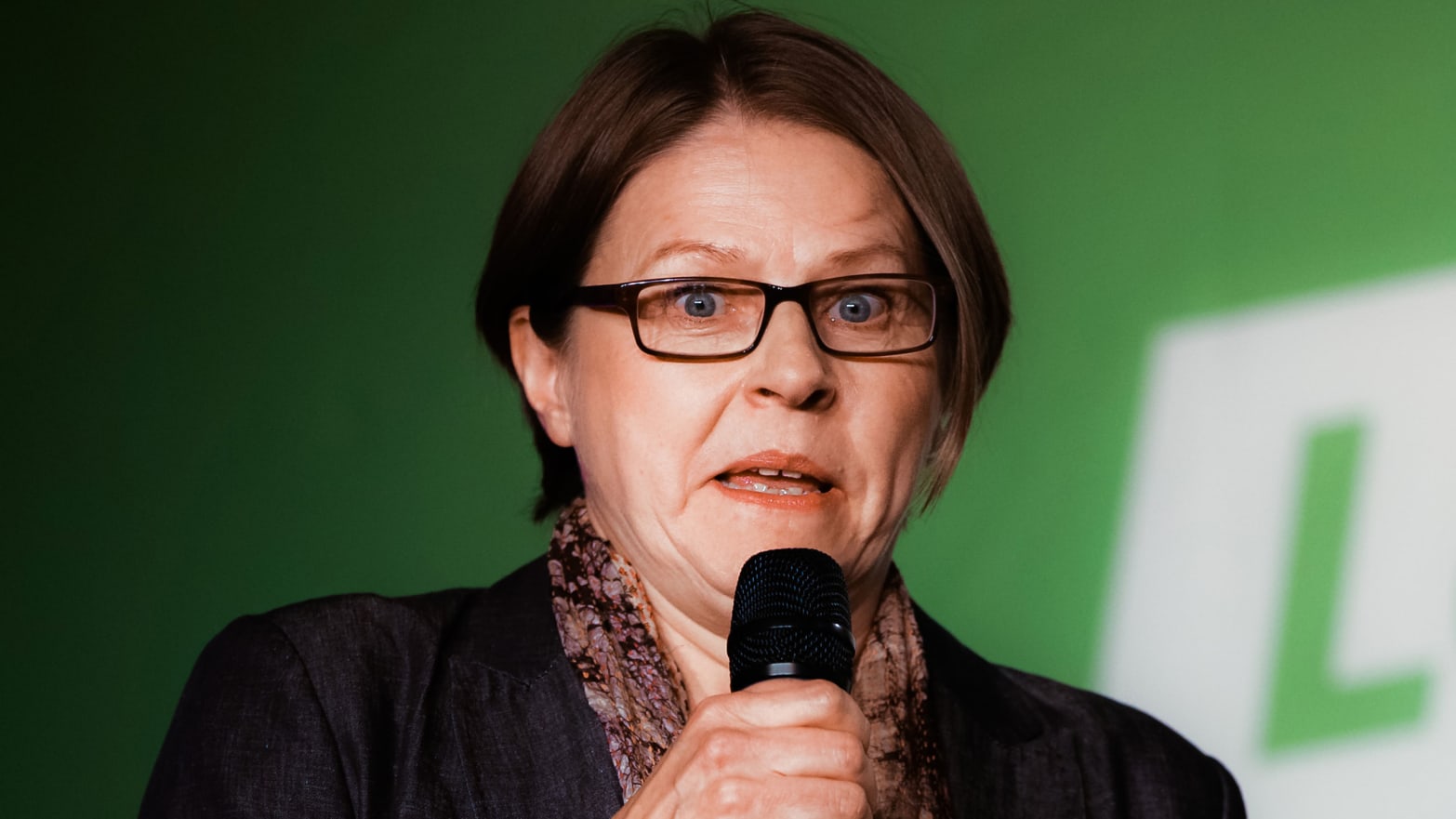LONDON—A senior member of the European Green Party is secretly campaigning against an anti-corruption resolution in the European Parliament that would target President Putin.
Heidi Hautala, a vice president of the European Parliament, has been arguing behind-the-scenes that the European Union has an anti-Putin “obsession” and lawmakers “want to target Russia” according to emails leaked to The Daily Beast.
One outraged fellow Green Member of the European Parliament said obstructionists like Hautala “are either naive useful idiots or knowingly on the Kremlin’s leash.”
The Russian president has frequently expressed his hatred for a series of anti-graft sanctions laws that have been implemented around the world in the name of Sergei Magnitsky, a lawyer who died in jail after uncovering a $230 million fraud perpetuated and covered up by the Russian state.
The first version of the law, which has since been used to impose U.S. sanctions on 49 Russian officials and associates of Putin, was signed by President Obama in 2012.
The European Union is set to bring in its own version of the law but campaigners—most of whom are working in the shadows—have succeeded in removing Magnitsky’s name from the act. A group of lawmakers in the European Parliament is working on a resolution that would demand the European Council restore his name to the sanctions instrument.
Hautala was once a prominent campaigner against corruption in Russia but in recent years the Finnish politician has taken a radically different position.
In April 2016, Hautala attempted to screen a pro-Kremlin propaganda movie in Brussels. The screening was canceled at the last minute after a furious bust-up within the Green Party grouping. It attracted relatively little attention at the time but the film, Magnitsky Act: Behind the Scenes, would gain notoriety when it emerged that it was at the heart of a mission to the U.S. two months later by Natalia Veselnitskaya, which included a meeting at Trump Tower in New York with Trump’s senior presidential campaign team and a screening of the same film at the Newseum in Washington, D.C.
Veselnitskaya, who has variously been described as a Russian cut-out, a trusted Kremlin insider, or “an informant” for the Russian prosecutor general's office, worked with Hautala to set up the screening in Brussels, as did the movie’s director, Andrei Nekrasov.
The relationship between Hautala and Nekrasov is extremely close. In 2013, a press officer for Hautala described Nekrasov as her “civil husband” according to BaltInfo. Nekrasov was described as Hautala’s boyfriend in an interview he gave defending her in the midst of a domestic political scandal in the Finnish tabloid Ilta-Sanomat. In 2016, Hautala told EU Observer, “we are close friends; I've known him many years.”
Whatever the precise nature of their relationship, Hautala said at the time of the aborted Brussels screening that she just wanted to give Nekrasov’s film a fair hearing. “I know I’ve put myself in the firing line, but I really want to know what the facts are,” she said.
In the same month, “Putin’s favourite Congressman” then-Rep. Dana Rohrabacher (R-CA) and his chief of staff Paul Behrends were handed a copy of the movie by the Russian Prosecutor General’s office during a controversial trip to Moscow. Rohrabacher’s office then helped Veselnitskaya hold a U.S. screening of the movie which pushes Putin’s view that the Magnitsky Act was a fraud.
A day after The Daily Beast reported on Rohrabacher and Behrends involvement in promoting the movie on Capitol Hill, Behrends was ousted from his job on the House Foreign Affairs subcommittee in July 2017.
Three European Parliament sources have told The Daily Beast that Hautala’s “passionate” opposition to the Magnitsky legislation continues to this day.
The Green Party bloc is expected to hold the casting vote on a European parliamentary resolution to call for the restoration of Magnitsky’s name in the coming days. A senior parliamentary source said Hautala had been lobbying ferociously against Magnitsky’s inclusion, and said that she has won over other Green party members who believe it would be better not to single out corruption in Russia and may make it easier to enact the new sanctions instrument.
“All of a sudden she changed. Heidi Hautala has become really obsessed in this fight; she is like a crusader,” said a European Parliament insider. “Her campaign in the European Parliament is making everyone suspicious.”
A source from the European People's Party said: “Clearly Ms. Hautala is the key anti-Magnitsky campaigner.”
Hautala did not respond to questions from the Daily Beast.
On Monday night, a Brussels insider said a link to Nekrasov’s anti-Magnitsky movie was being circulated to Green Party members ahead of the vote.
The Daily Beast has also learned that seven Green Party lawmakers including Eva Joly, the Green French presidential candidate in 2012, another former French presidential candidate José Bove, veteran Estonian Member of European Parliament Indrek Tarand, and Rebecca Harms, the former president of The Greens–European Free Alliance (EFA), wrote an internal letter to the group’s co-presidents last month calling on the Greens to reject Hautala’s campaign.
The letter reads: “Some colleagues argue now that we in the European Parliament should avoid the reference to the Magnitsky case … because some member states are reluctant to criticise Russia. We don't think that this is the right way to go …. We consider the reference to Sergey Magnitsky important because it reminds us about the reasons why we need such an act.”
Tarand told The Daily Beast that he had been a firm advocate of including Magnitsky’s name from the start of the debate and ensuring that the EU emulated the U.S., Canada, Britain, and all three Baltic states Estonia, Latvia, and Lithuania.
“A minority of colleagues argue that in the European Parliament we should avoid the reference to the Magnitsky case ... However, this would have the effect of diluting our condemnation of Putin’s transgressions,” he said. “Those who oppose mentioning Magnitsky by name are either naive useful idiots or knowingly on the Kremlin’s leash.”
There is likely to be a vote of Green-EFA group members before the European Parliament’s next plenary sitting which begins on March 11 to decide on the group’s formal position. At a human rights sub-committee debate two weeks ago, two members of the European Green Party—Dutch GreenLeft member Judith Sargentini and Barbara Lochbihler, of the German Greens—argued that adding the name Magnitsky should not be a priority.
Hautala re-emphasized the strength of her feeling on February 13 when she accidentally hit reply-all to an internal party email. The message intended for one of her colleagues ended up in around 300 inboxes on the Green/EFA mailing list. “Between us I am actually quite pleased not to sign this [resolution] because of this obsession on Magnitsky. Over and over again the proponents prove that they deliberately want to target Russia,” she wrote in the email, which was passed to The Daily Beast.
She also complained that Bill Browder, for whom Magnitsky was working at the time of his death, had been invited to Brussels to campaign for the inclusion of the name last month. “He is literally everywhere” she said.
Browder, who was once the largest foreign investor in Russia and now campaigns against corruption in the country, said he had been surprised by Hautala’s conversion into an ally of Russia on this issue.
“The only reason I cooperated with Nekrasov on his film at the beginning was that I understood he was Heidi Hautula’s boyfriend and she was a big supporter of the Magnitsky campaign at the European Parliament,” he told The Daily Beast. “I met them together for the first time when they were on a trip to the Netherlands in 2010.”
He is now concerned that Hautala’s campaign may succeed in frustrating a European effort to confront Putin. “We need the four main political parties onboard. The Greens can effectively block the Magnitsky name from the EU law.”
Jill Stein, the Green Party’s U.S. presidential candidate in 2012 and 2016, has been cultivated by the Kremlin in recent years. In 2015, she was invited to the tenth anniversary party of the Russian propaganda network RT in Moscow. She was seated at the top table with President Putin and Michael Flynn, who went on to briefly serve as Trump’s national security advisor where he lied to the FBI about contacts with Russia.
Stein defended Russian attitudes towards Ukraine during the trip and explained that Putin confided that he agreed with her “on many issues.” It has been reported that Russian election interference in 2016 was partly directed towards securing votes for the Green Party, which would have had the obvious dual aim of promoting Stein’s outsider views and helping Trump to defeat Hillary Clinton by appealing to potential Democratic voters.
It’s far harder to explain the apparent affection for Vladimir Putin within elements of the Green Party.

